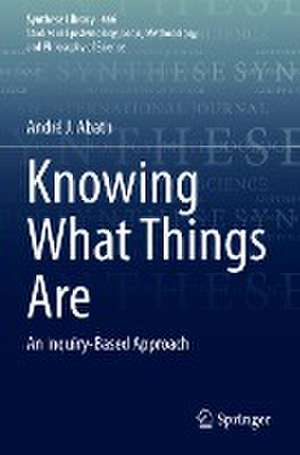Knowing What Things Are: An Inquiry-Based Approach: Synthese Library, cartea 466
Autor André J. Abathen Limba Engleză Paperback – 10 aug 2023
‘Knowing What Things Are’ should be of interest to researchers in Epistemology, Philosophy of Language,Metaphysics, Philosophy of Mind, Social Philosophy and Linguistics.
| Toate formatele și edițiile | Preț | Express |
|---|---|---|
| Paperback (1) | 719.76 lei 43-57 zile | |
| Springer International Publishing – 10 aug 2023 | 719.76 lei 43-57 zile | |
| Hardback (1) | 725.75 lei 43-57 zile | |
| Springer International Publishing – 9 aug 2022 | 725.75 lei 43-57 zile |
Din seria Synthese Library
- 15%
 Preț: 638.43 lei
Preț: 638.43 lei - 18%
 Preț: 989.98 lei
Preț: 989.98 lei - 15%
 Preț: 596.69 lei
Preț: 596.69 lei - 18%
 Preț: 903.93 lei
Preț: 903.93 lei - 15%
 Preț: 586.88 lei
Preț: 586.88 lei - 15%
 Preț: 696.50 lei
Preț: 696.50 lei - 18%
 Preț: 892.90 lei
Preț: 892.90 lei - 15%
 Preț: 643.34 lei
Preț: 643.34 lei -
 Preț: 282.33 lei
Preț: 282.33 lei - 5%
 Preț: 372.19 lei
Preț: 372.19 lei -
 Preț: 443.10 lei
Preț: 443.10 lei - 15%
 Preț: 637.59 lei
Preț: 637.59 lei - 18%
 Preț: 958.88 lei
Preț: 958.88 lei - 15%
 Preț: 642.36 lei
Preț: 642.36 lei - 18%
 Preț: 1230.66 lei
Preț: 1230.66 lei - 15%
 Preț: 642.83 lei
Preț: 642.83 lei - 18%
 Preț: 1000.39 lei
Preț: 1000.39 lei -
 Preț: 389.70 lei
Preț: 389.70 lei - 15%
 Preț: 637.28 lei
Preț: 637.28 lei - 18%
 Preț: 952.26 lei
Preț: 952.26 lei - 18%
 Preț: 1231.32 lei
Preț: 1231.32 lei - 15%
 Preț: 645.96 lei
Preț: 645.96 lei -
 Preț: 395.85 lei
Preț: 395.85 lei -
 Preț: 400.47 lei
Preț: 400.47 lei - 18%
 Preț: 1225.48 lei
Preț: 1225.48 lei - 15%
 Preț: 638.89 lei
Preț: 638.89 lei - 18%
 Preț: 1232.09 lei
Preț: 1232.09 lei -
 Preț: 380.45 lei
Preț: 380.45 lei -
 Preț: 394.87 lei
Preț: 394.87 lei - 15%
 Preț: 640.37 lei
Preț: 640.37 lei - 15%
 Preț: 639.08 lei
Preț: 639.08 lei -
 Preț: 381.98 lei
Preț: 381.98 lei - 15%
 Preț: 643.00 lei
Preț: 643.00 lei - 15%
 Preț: 672.29 lei
Preț: 672.29 lei
Preț: 719.76 lei
Preț vechi: 877.76 lei
-18% Nou
Puncte Express: 1080
Preț estimativ în valută:
137.74€ • 143.28$ • 113.72£
137.74€ • 143.28$ • 113.72£
Carte tipărită la comandă
Livrare economică 14-28 aprilie
Preluare comenzi: 021 569.72.76
Specificații
ISBN-13: 9783031073670
ISBN-10: 3031073673
Pagini: 138
Ilustrații: X, 138 p. 1 illus.
Dimensiuni: 155 x 235 mm
Greutate: 0.22 kg
Ediția:1st ed. 2022
Editura: Springer International Publishing
Colecția Springer
Seria Synthese Library
Locul publicării:Cham, Switzerland
ISBN-10: 3031073673
Pagini: 138
Ilustrații: X, 138 p. 1 illus.
Dimensiuni: 155 x 235 mm
Greutate: 0.22 kg
Ediția:1st ed. 2022
Editura: Springer International Publishing
Colecția Springer
Seria Synthese Library
Locul publicării:Cham, Switzerland
Cuprins
1. Introduction.- Part I. Toward the Erotetic View. 2. The Knowledge of What Things Are: Possible Views.- 3. Questions and Answers: Understanding Knowledge-Wh.- 4. The Erotetic View.- Part II. Developing the Erotetic View. 5. The Gradability of the Knowledge of What Things Are.- 6. Social Kinds, the Erotetic View and Erotetic Amelioration.- 7. The Knowledge of What Things Are: Ignorance and Obligations.- Appendix A. Having Concepts and Knowing What Things Are.- Appendix B. Incomplete Understanding of Concepts and the Gradability of the Knowledge of What Things Are.- Appendix C. The Knowledge of What Particular Things Are.
Notă biografică
André J. Abath (PhD Sheffield) is Professor of Philosophy at the Federal University of Minas Gerais (UFMG), in Brazil. His teaching and research engage the fields of philosophy of mind, language and epistemology.
Textul de pe ultima copertă
This book provides an account of what is to know what things are, focusing on kinds, both natural (such as water) and social (such as marriage). It brings tools from an area that has received much attention in recent years, the epistemology of inquiry. The knowledge of what things are is to be understood as resulting from successful inquiries directed at questions of the form ‘What is x?’, where x stands for a given kind of thing. The book also addresses knowledge-wh in general (which includes knowledge-who and knowledge-where), as well as the phenomenon of ignorance regarding what things are and our obligations in respect to knowing what things are. It also brings to light new avenues of research for those interested in the relation between the knowledge of what things are and concept possession and amelioration.
‘Knowing What Things Are’ should be of interest to researchers in Epistemology, Philosophy of Language, Metaphysics, Philosophy of Mind, Social Philosophy and Linguistics.
Caracteristici
Provides the first detailed and systematic account of the knowledge of what things are Provides a link between the literature on knowledge-wh and the literature on the epistemology of inquiry Features discussions from Epistemology, Philosophy of Language, Metaphysics, Philosophy of Mind etc
